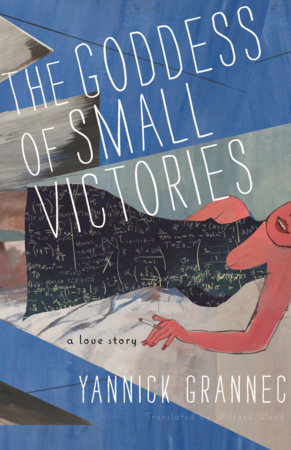READERS GUIDE
1. Why do you think Yannick Grannec chose to write about Kurt Gödel’s life from the perspective of his wife? How does this choice change what we see of Gödel? How is it different from what we might have read had this been a biography of the mathematician?
2. Anna often reflects on the sense of purposelessness she feels in her life. (See “The sum of little bits of wasted time and the lateness of
others added up to a lost life,” p 27; “What worries me is that I’m not doing anything with my life,” p 183.) How does this relate to her professional ambition and her relationships with Adele, her parents, and Leo? How does it compare to Kurt Gödel’s passion for his work?
3. How are Adele’s devotion to Kurt and Kurt’s devotion to his work similar?
4. How does Adele and Anna’s relationship change over the course of the novel? Why does Adele open up to her and not to any of the other people sent to retrieve the
Nachlass? What light does Adele’s story of her life with Kurt shed on Anna’s own life?
5. On page 29 Adele says, “Humor is requisite for survival, young lady. Especially here.” What purpose does humor serve in the novel?
6. What is the effect of viewing significant historical events and individuals, such as the Anschluss, J. Robert Oppenheimer, and Albert Einstein’s death, through the lens of Adele and Kurt’s marriage?
7. Adele, Anna, and Kurt all feel outcast from their environments. Why is Adele able to communicate her lonesomeness to Anna but not to Kurt? In what ways do Anna and Adele’s outcast status differ from Kurt’s?
8. Adele and Kurt both are more concerned with their personal lives than with the political situations around them. How is this reflected in Anna’s initial preoccupation with getting Kurt’s papers from Adele?
9. What is the difference between the story Adele tells herself and the account Elizabeth Glinka gives about the Gödels’ home life? Does it alter Anna’s or your understanding of Adele and her life with Kurt?
10. On page 233 Adele tells Albert Einstein, “A good excuse to share nothing and keep everything among yourselves, among the elect. I thought you were more democratic, Herr Einstein.” What do you think about Adele’s assertion that the intelligentsia purposefully limit access to their work? Can her observation apply to her relationship with Kurt Gödel?
11. Adele believes that she was created “to keep a certain genius from slipping away before his time,” that she “had been compost for the sublime.” In contrast, Anna concludes that “No one has a mission. Adele had loved Kurt; nothing was more important.” With whom do you agree and why?

